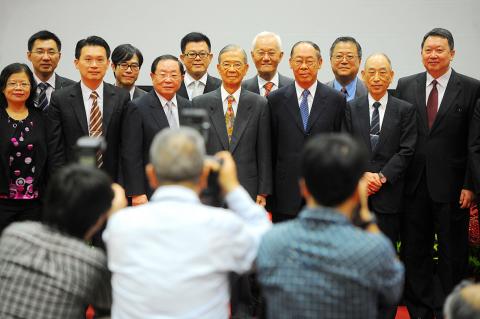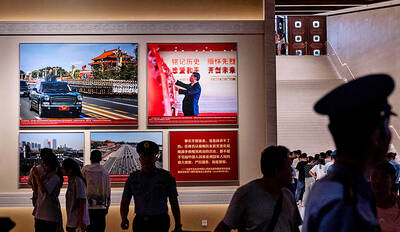The Government Information Office (GIO) — a government department in operation for 65 years — will be dissolved on Sunday.
The GIO’s functions will be split between the Executive Yuan, a new ministry of culture and the Ministry of Foreign Affairs as part of a government restructuring project which will see the Executive Yuan reduce its current 37 agencies to 29 in a bid to improve efficiency.
The dissolution of the GIO has not been welcomed by People First Party Chairman James Soong (宋楚瑜) and Greater Taichung Mayor Jason Hu (胡志強), both of whom served as head of the GIO under previous Chinese Nationalist Party (KMT) administrations.

Photo: Wang Min-wei, Taipei TiMES
Neither was present at a farewell assembly, but they voiced their disapproval at the plan in interviews for two recent books on the GIO.
Speaking about the restructuring, Soong was quoted saying: “I have to say with sincerity that the Republic of China (ROC) can continue to exist without diplomacy, but it cannot live one day without an international publicity campaign.”
Soong said he was “very much opposed” to the policy to fold the GIO into the foreign ministry and “even more opposed” to the disbandment of the GIO.
Under the plan, GIO departments responsible for broadcasting, motion pictures and publications will be part of the ministry of culture, the international information department will fall under the control of the foreign ministry and the GIO’s domestic information department will be launched as a new service subordinate to the Executive Yuan.
Arguing in favor of maintaining the GIO, Soong said the organization differed from the foreign ministry and that diplomats are tasked to uphold diplomacy, while information officers promote national values both at home and overseas. Hu said he failed to see the need for GIO restructuring because the organization generates good results.
At the farewell assembly, President Ma Ying-jeou (馬英九) encouraged GIO employees to continue to serve the country after they relocate to different agencies.
The GIO was established in 1947 in Nanjing before the then-KMT regime was forced to flee in 1949.
Premier Sean Chen (陳冲) said he could have ended up working at the GIO because he once ranked highly in a national exam for international information officers while working at a bank in his youth, however he said he chose to stay in the financial sector.
GIO Minister Philip Yang (楊永明) said the government agency has been witness to key moments in the country’s history including Taiwan’s withdrawal from the UN in 1971, the severance of diplomatic relations with the US in 1978, the lifting of martial law in 1987 and the first presidential election in 1996.
“In the past 65 years, GIO workers have stuck to their positions. They were never absent from any critical moment of the nation. Although we will see the GIO fade into history on May 20, GIO workers will continue the glory of the GIO in their new positions,” Yang said.

Three batches of banana sauce imported from the Philippines were intercepted at the border after they were found to contain the banned industrial dye Orange G, the Food and Drug Administration (FDA) said yesterday. From today through Sept. 2 next year, all seasoning sauces from the Philippines are to be subject to the FDA’s strictest border inspection, meaning 100 percent testing for illegal dyes before entry is allowed, it said in a statement. Orange G is an industrial coloring agent that is not permitted for food use in Taiwan or internationally, said Cheng Wei-chih (鄭維智), head of the FDA’s Northern Center for

The Chinese military has built landing bridge ships designed to expand its amphibious options for a potential assault on Taiwan, but their combat effectiveness is limited due to their high vulnerability, a defense expert said in an analysis published on Monday. Shen Ming-shih (沈明室), a research fellow at the Institute for National Defense and Security Research, said that the deployment of such vessels as part of the Chinese People’s Liberation Army (PLA) Navy’s East Sea Fleet signals a strong focus on Taiwan. However, the ships are highly vulnerable to precision strikes, which means they could be destroyed before they achieve their intended

About 4.2 million tourist arrivals were recorded in the first half of this year, a 10 percent increase from the same period last year, the Tourism Administration said yesterday. The growth continues to be consistent, with the fourth quarter of this year expected to be the peak in Taiwan, the agency said, adding that it plans to promote Taiwan overseas via partnerships and major events. From January to June, 9.14 million international departures were recorded from Taiwan, an 11 percent increase from the same period last year, with 3.3 million headed for Japan, 1.52 million for China and 832,962 to South Korea,

REWRITING HISTORY: China has been advocating a ‘correct’ interpretation of the victory over Japan that brings the CCP’s contributions to the forefront, an expert said An elderly Chinese war veteran’s shin still bears the mark of a bullet wound he sustained when fighting the Japanese as a teenager, a year before the end of World War II. Eighty years on, Li Jinshui’s scar remains as testimony to the bravery of Chinese troops in a conflict that killed millions of their people. However, the story behind China’s overthrow of the brutal Japanese occupation is deeply contested. Historians broadly agree that credit for victory lies primarily with the Chinese Nationalist Party (KMT)-led Republic of China (ROC) Army. Its leader, Chiang Kai-shek (蔣介石), fled to Taiwan in 1949 after losing a